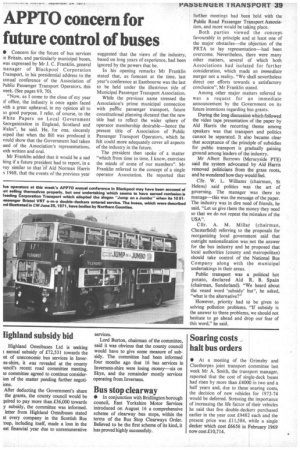APPTO concern for future control of buses
Page 35

If you've noticed an error in this article please click here to report it so we can fix it.
• Concern for the future of bus services in Britain. and particularly municipal buses, was expressed by Mr J. C. Franklin, general manager of Blackpool Corporation Transport. in his presidential address to the innual conference of the Association of Public Passenger Transport Operators, this ,veek. (See pages 69, 70).
"Now, as I come to the close of my year 3f office. the industry is once again faced with a great upheaval, in my opinion all to lo good purpose. 1 refer, of course, to the White Papers on Local Government teorganization in England. Scotland and Wales", he said. He. for one, sincerely loped that when the Bill was produced it vould show that the Government had taken teed of the Association's representations. ioth written and oral.
Mr Franklin added that it would be a sad hing if a future president had to report, in a vay similar to that Of Ald Norman Harris n 1968. that the events of the previous year suggested that the views of the industry, based on long years of experience, had been ignored by the powers that be.
In his opening remarks Mr Franklin stated that, as forecast at the time, last year's conference at Eastbourne was the last to be held under the illustrious title of Municipal Passenger Transport Association.
While the previous name stressed the Association's prime municipal connection with puBlic passenger transport. future constitutional planning dictated that the new title had to reflect the wider sphere of operator membership desirable—hence the present title of Association of Public Passenger Transport Operators, which he felt could more adequately cover all aspects of the industry in the future.
The president then spoke of a matter "which from time to time, I know, exercises the minds of some of our members". Mr Franklin referred to the concept of a single operator Association. He reported that further meetings had been held with the Public Road Passenger Transport Association, and more would be taking place.
Both parties viewed the concept. favourably in principle and at least one of the major obstacles—the objection of the PRTA to lay representation—had been overcome. Nevertheless, there were many other matters, several of which both Associations had isolated for further consideration, which made an immediate merger not a reality. "We shall nevertheless direct our efforts towards a satisfactory conclusion", Mr Franklin stated.
Among other major matters referred to was a request for an immediate announcement by the Government on its future intentions regarding bus grants.
During the long discussion which followed the video tape presentation of the paper by Aid Harris the recurring theme among speakers was that transport and politics cannot be separated. It also became clear that acceptance of the principle of subsidies for public transport is gradually gaining ground among leaders of the industry.
Mr Albert Burrows (Merseyside PTE) said the system advocated by Aid Harris removed politicians from the grass roots, and he wondered how they would feel.
ClIr. W. L. Williams (chairman, St Helens) said politics was the art of governing. The manager was there to manage—this was the message of the paper. The industry was in dire need of friends, he said, "Let us give them the money they need so that we do not repeat the mistakes of the USA".
Cllr. A. M. Millar (chairman, Chesterfield) referring to the proposals for reorganizing local government said that outright nationalization was not the answer for the bus industry and he proposed that local authorities (county and metropolitan) should take control of the National Bus Company along with the municipal undertakings in their areas.
Public transport was a political hot potato, declared Ald R. B. Spain (chairman, Sunderland). "We heard about the vexed word 'subsidy' but", he asked, "what is the alternative?"
However, priority had to be given to solving pollution problems. "If subsidy is the answer to these problems, we should not hesitate to go ahead and drop our fear of this word," he said.










































































































